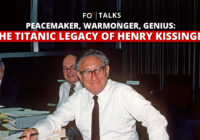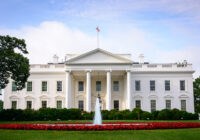On February 24, 2022, Russia invaded Ukraine as concerns about Ukraine joining NATO grew. Over two years later, the war rages on and global powers continue to ignore pleas for negotiation even as the death toll mounts. With Russia now threatening the international community, the United States has a responsibility to engage in negotiations.
Ukraine, NATO and the Soviet Union
Russia’s invasion of Ukraine is not simply a territorial land grab. There is a long and complex history between the two countries that exist in the context of a tense global political climate.
After Russia, Ukraine is the largest country in Europe. The two nations share deep cultural, economic, familial and political ties. But compared to Russia, Ukraine is a fledgling nation. Ukraine officially gained independence from the USSR in 1991, but has since had a difficult time escaping Russian influence and finding stability.
After WWII, the rivalrous Cold War began between the US and the Soviet Union, which at the time included Ukraine. Two years later, the US led the creation of the North Atlantic Treaty Organization (NATO) to resist Soviet expansion. To balance the scale, the Soviet Union created the Warsaw Treaty Organization (WTO), also known as the Warsaw Pact, in 1955.
In 1991, the Soviet Union and the Warsaw Pact fell. There was no longer a need for NATO. However, NATO did not dissolve. Despite assurances from the US and NATO’s Secretary to limit expansion, NATO engaged in membership talks with numerous post-Soviet republics and satellite states, such as Ukraine.
The US affirmed its support for Ukraine joining NATO with NATO’s 2009 Declaration to Complement the Charter. In the following years, the US channeled both political and financial support to Ukraine and began aiding the country with military supplies, becoming Ukraine’s biggest defense partner.
America’s place in the war
The conflict between Russia and Ukraine has been catastrophic, costing billions of dollars and resulting in nearly one million casualties. While US President Joe Biden has made it a point to show his support for Ukraine, some argue that international involvement in the war has been uncalled for and driven by political interests.
While serving as vice president, Biden supported the termination of a top prosecutor in Ukraine. The prosecutor was investigating Burisma, a private energy company where Biden’s son Hunter served as a board member. During his time at the company, Hunter made one million dollars per year. Political opponents accused Biden of abusing his power as vice president to benefit his family’s personal financial benefit.
On September 24 at the United Nations, Biden spoke proudly of American democracy. He dared to say “I’ve made the preservation of democracy the central cause of my presidency.” Yet his role in the Russia–Ukraine War says otherwise. While at least 70% of Americans want negotiations to end the war in Ukraine, Biden ignores the will of the people and brutally continues escalating the war by providing weapons and $175 billion in aid to Ukraine.
However, the role of the US is not simply that of an individual actor. The US also leverages its immense power within NATO to influence the war strategically.
NATO’s mistakes
In reality, NATO has been a disaster for the world. The organization and its allies have stockpiled biological, radiological, chemical and nuclear weaponry. Led by the US, NATO member states have aided and armed belligerent nations, such as Israel against the Palestinians, Lebanese and Syrians. They armed and provided intelligence to Saudi Arabia against Yemenis. They instigated civil wars in Libya and Syria. The US alone has a military presence in many nations and participates in military alliances, often in support of NATO members. A recent example is the US involvement in Niger in support of France, but now, both countries are arguing on how to deal with the junta that overthrew the president.
The Russia–Ukraine war and the bloodbath caused by Israel in Palestine are testimonies to NATO members’ destructive behaviors, which violate the organization’s commitment to the UN to support global peace and security.
As for the situation in Ukraine, NATO continued expanding east despite Russia’s persistent objections. In December 2021, Russia gave its last official warning to NATO to cease this expansion. Russia demanded, among other things, that NATO bar any military activity in Ukraine. Putin also referenced alleged genocide being carried out in eastern regions of the country and the need to denazify a fascist, Western-leaning Ukraine to further justify the invasion.
If Ukraine had joined NATO, Russia could have had US offensive nuclear missiles right at its borders. By permitting Ukraine to stay neutral, NATO could have prevented the catastrophic war. But, as usual, the US-led NATO ignored the warnings.
Unable to resolve the concerns through negotiation, Russia deemed itself forced to invade Ukraine. For Americans to understand Russian concerns about Ukraine joining NATO, they might see a parallel with the 1962 Cuban Missile Crisis, when the Soviets installed some of their offensive nuclear missiles in Cuba. If the Soviets had not withdrawn those missiles, it could have resulted in another world war. Regrettably, Biden has not demonstrated the same circumspection that Soviet Premier Nikita Khrushchev did when he decided not to provoke his adversary further.
As a result, the Russia–Ukraine war has gone on and has been one of the deadliest European wars in history. As of September, Russia incurred over 610,000 casualties and Ukraine around 480,000. All that could have been prevented if the US-led NATO opted for negotiation.
The world is wising up. Many nations do not support US-led NATO action against Russia and reject efforts to isolate Russia, instead favoring peace.
Negotiating peace is the right thing to do
As in the Cuban Missile Crisis, negotiation has been the only way to resolve these issues effectively. Escalation may ultimately lead to nuclear war, threatening the existence not only of the US and Russia but the entire world. Many nations would like to see a ceasefire and meaningful negotiations, especially regional powers that are sympathetic to Russia such as China, India and Iran.
To stop further destruction, NATO must allow Ukraine to remain a neutral country outside of the organization. But suppose that does not mitigate the Russian security concerns. In that case, NATO may have to withdraw the membership of Estonia, Latvia and Lithuania to support further neutrality. Before his death, political scientist Henry A. Kissinger even suggested that NATO allies push Ukraine to give up territory to stop the war.
Yet, a far better solution for global peace would be the dissolution of NATO itself. A US-led NATO interfering in the affairs of other countries has caused much pain and suffering across the globe. It is time for the organization to be tethered or dissolved for good.
Achieving peace requires that all parties come to the table and negotiate, give up something they want and atone for past wrongs. As hundreds continue to die each day, it is high time for the US to recognize these truths and take steps toward achieving peace.
[Emma Johnson edited this piece.]
The views expressed in this article are the author’s own and do not necessarily reflect Fair Observer’s editorial policy.
Support Fair Observer
We rely on your support for our independence, diversity and quality.
For more than 10 years, Fair Observer has been free, fair and independent. No billionaire owns us, no advertisers control us. We are a reader-supported nonprofit. Unlike many other publications, we keep our content free for readers regardless of where they live or whether they can afford to pay. We have no paywalls and no ads.
In the post-truth era of fake news, echo chambers and filter bubbles, we publish a plurality of perspectives from around the world. Anyone can publish with us, but everyone goes through a rigorous editorial process. So, you get fact-checked, well-reasoned content instead of noise.
We publish 2,500+ voices from 90+ countries. We also conduct education and training programs
on subjects ranging from digital media and journalism to writing and critical thinking. This
doesn’t come cheap. Servers, editors, trainers and web developers cost
money.
Please consider supporting us on a regular basis as a recurring donor or a
sustaining member.
Will you support FO’s journalism?
We rely on your support for our independence, diversity and quality.











Comment